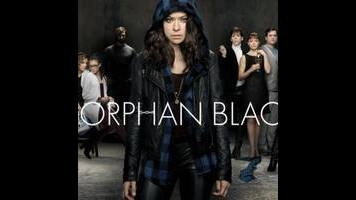Orphan Black’s third season almost devolves into chaos before finding its feet

Throughout its excellent second season, Orphan Black was always in danger of tossing one too many balls in the air. In addition to exploring female identity through five clones (Tatiana Maslany as Sarah Manning, Alison Hendrix, Cosima Niehaus, Rachel Duncan, and Helena), the ever-expanding show introduced multiple shadowy corporations, corrupt religious institutions, scientific mysteries, conspiracies-within-conspiracies, and uneasy alliances. The season finale added yet another factor: a line of male clones known as Project Castor who were developed for, and controlled by, the military. The third-season premiere struggles to keep all those elements in the air as it reintroduces major players and key plots, but once the show settles into familiar patterns, it’s as good as it’s ever been.
Orphan Black explicitly explores the female experience through a sci-fi lens—adding male identity issues could have diluted that thesis statement, but the show thankfully keeps its focus on the female Project Leda clones first and foremost, continuing to explore themes of female agency and consent while using the Castor clones as supporting players. That’s a smart choice for the show as a whole, but it’s a slight detriment to the premiere, which struggles to define its three newly introduced Castor clones (Ari Millen now plays Rudy, Seth, and Miller in addition to Mark, the previously introduced reformed Prolethean). It doesn’t help that the men are not as visually distinct as the female clones. And since the militaristic Castor clones are meant to be less individualized than the Leda women, Millen in some ways has an even tougher challenge than Maslany when it comes to distinguishing them. He handles the task admirably, but without her finesse.
Yet the second episode proves Orphan Black has a firm handle on the Castor clones and the issues of masculinity and brotherhood they represent. It goes a long way to clarifying their personalities, particularly scar-faced Rudy and mustachioed Seth, who view themselves as brothers (with a healthy dose of psychosexual issues on the side). There are still way more questions than answers about Project Castor—and the male clone’s role on the show—but the second episode proves these new characters can compliment the show’s female leads without overwhelming them.
Instead, the female clones rightly take center stage in these first two episodes. Last year’s season finale actually left the Clone Club in relative stability: Dyad leader Rachel was incapacitated with a pencil to the eye, uptight soccer mom Alison reconnected with her husband/ex-monitor Donnie (Kristian Bruun), bohemian scientist Cosima miraculously returned from the brink of death, and ex-punk single mom Sarah gained a powerful ally in Dyad uber-exec Marion Bowles (Michelle Forbes). In trying to insert premiere-worthy drama to that stable world, the show overreaches a bit, mudding the waters with creepy corporate agents, secret plans, and a whole lot of exposition.
In general, the new season doesn’t fully find its feet until the third act of its premiere, which involves the always-delightful trope of clones pretending to be other clones. Once the loose ends from season two are—at least momentarily—settled, the show realigns its key players in familiar places, playing to each character’s strengths while demonstrating just how far they’ve come since the series began.
Alison is once again entrenched in suburban social drama. Post-rehab she’s focused on reclaiming her neighborhood Queen Bee status by running for school trustee, and she and Donnie are way more fun as “Team Hendrix” than they ever were apart. Cosima soon refocuses on science, working on a clone-illness cure despite the fact that her girlfriend Delphine (Évelyne Brochu) has moved up the ranks at Dyad and now has bigger problems to worry about. Cosima’s strained relationship with Delphine and her willingness to think spiritually about her brush with death hint that the show might finally start deepening its least-developed clone. And Sarah is still trying to protect her family, which now includes not only her brother Felix (Jordan Gavaris) and her daughter Kira (Skyler Wexler), but also her clone sisters, her boyfriend Cal (Michiel Huisman), and her foster mom Mrs. S (Maria Doyle Kennedy).
Helena also returns to her own unique status quo: The unhinged Ukranian is once again being treated like property by a mysterious organization. Only this time around it’s the military, not the Proletheans, doing the manipulating.
Rather than explore the organization behind Project Castor through the male clones, the show makes the smart choice to use Helena as the entry point to that world (she was traded to them last season by Mrs. S). She’s subjected to “stress tests” (a.k.a. torture) by her new military captors, but in place of the disturbing imagery of her Prolethean captivity, the show inserts some unexpected comedy (most of it involving a scorpion), which keeps yet another Helena kidnapping plot from feeling like a retread.
While the past two seasons have juxtaposed science and religion, the show was mostly interested in demonstrating how both can be used to control women. Focusing on the military—which takes control of both female and male bodies—is a big shift. But these early episodes suggest Orphan Black can expand its focus without losing track of its protagonists.
And yet for all that complicated thematic material, Maslany still remains Orphan Black’s biggest draw. Her nuanced performances help offset the fact that there’s arguably too much happening at the start of season three. Some key players like Felix and Art (Kevin Hanchard) feel underused while others don’t show up at all. (Despite being refreshingly frank in the season finale, Marion and her clone daughter Charlotte are frustratingly absent as season three starts.) But after briefly getting lost in its complicated web of storytelling, the show slows down and puts it focus back on its characters. And though they might repeat themselves, Orphan Black feels as fresh as ever.
Reviews by Caroline Framke will run weekly.